
The Connecticut Agricultural Experiment Station (CAES) in cooperation with USDA U.S. Department of Agriculture’s Animal and Plant Health Inspection Service (APHIS), Plant Protection and Quarantine (PPQ) announce the detection of the box tree moth, Cydalima perspectalis (Walker), at a single retail nursery in Connecticut on boxwood imported from a nursery in Ontario, Canada. As of May 27, 2021, APHIS had confirmed the presence of box tree moth in three facilities in Michigan, one in Connecticut, and one in South Carolina. On May 26, 2021, APHIS issued a Federal Order to halt the importation of all host plants from Canada, including boxwood (Buxus species), Euonymus (Euonymus species), and holly (Ilex species).
The box tree moth is native to East Asia and has become a serious invasive pest in Europe, where it continues to spread. In 2018, it was found in the Toronto area of Canada. The caterpillars feed mostly on boxwood and heavy infestations can defoliate host plants. Once the leaves are gone, larvae consume the bark, leading to girdling and plant death.
If you bought a boxwood plant within the last few months, please inspect it for signs of the box tree moth. Box tree moth symptoms include green-black frass and silk threads on the host plant. The caterpillars are very cryptic and it is easier to look for the shiny abundant webbing or pupae. The box tree moth is a federally actionable/reportable pest, so please refer any findings to The Connecticut Agricultural Experiment Station at: CAES.StateEntomologist@ct.gov and include a photograph and location.